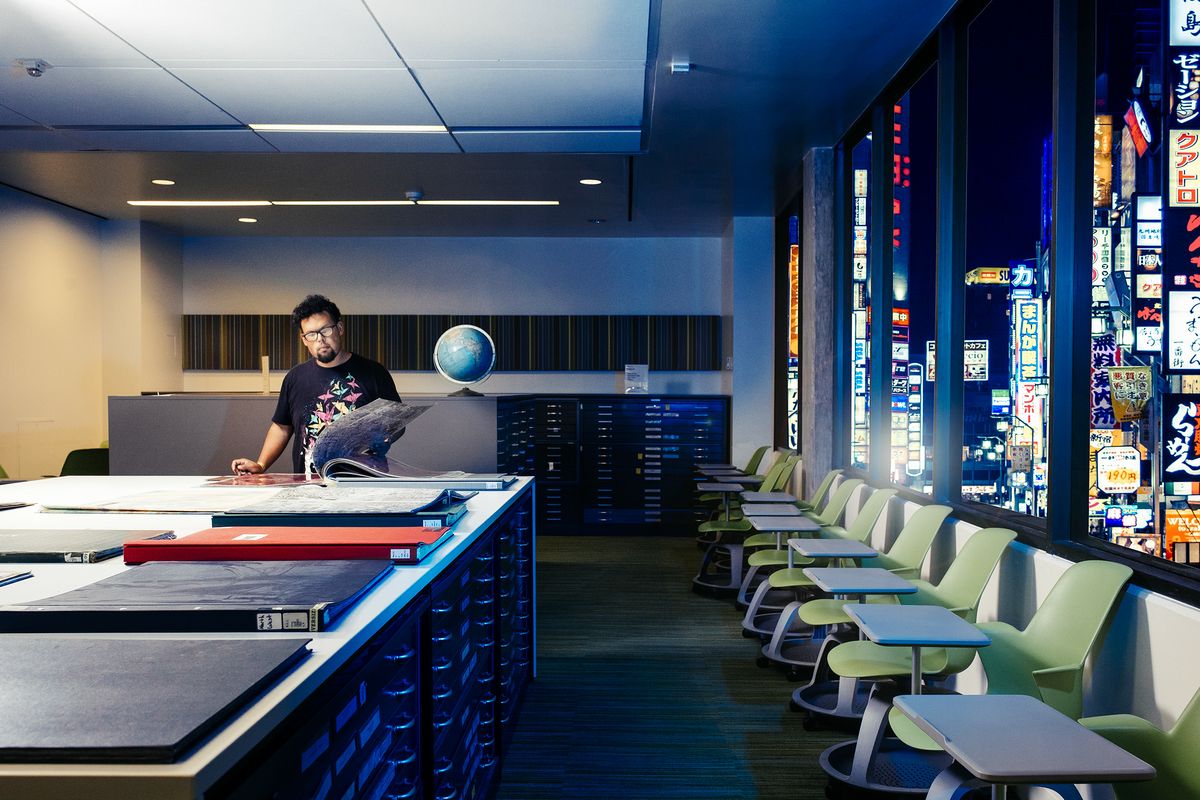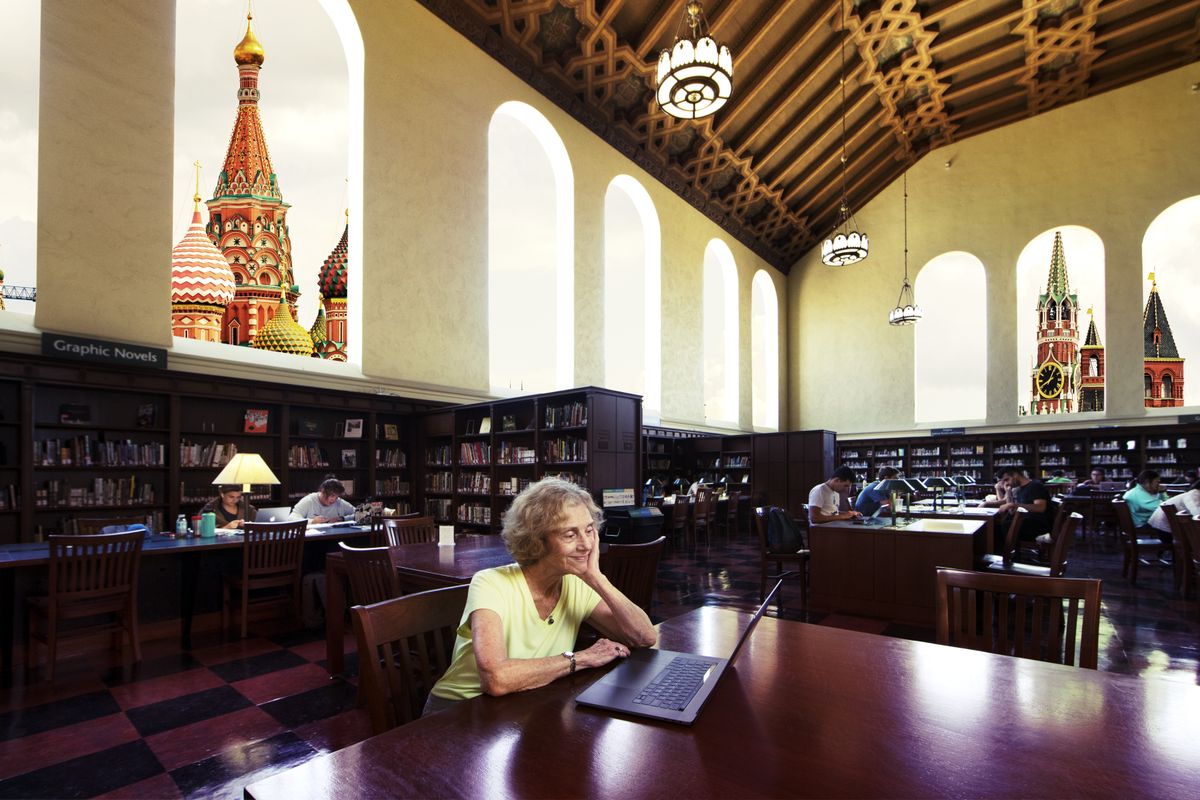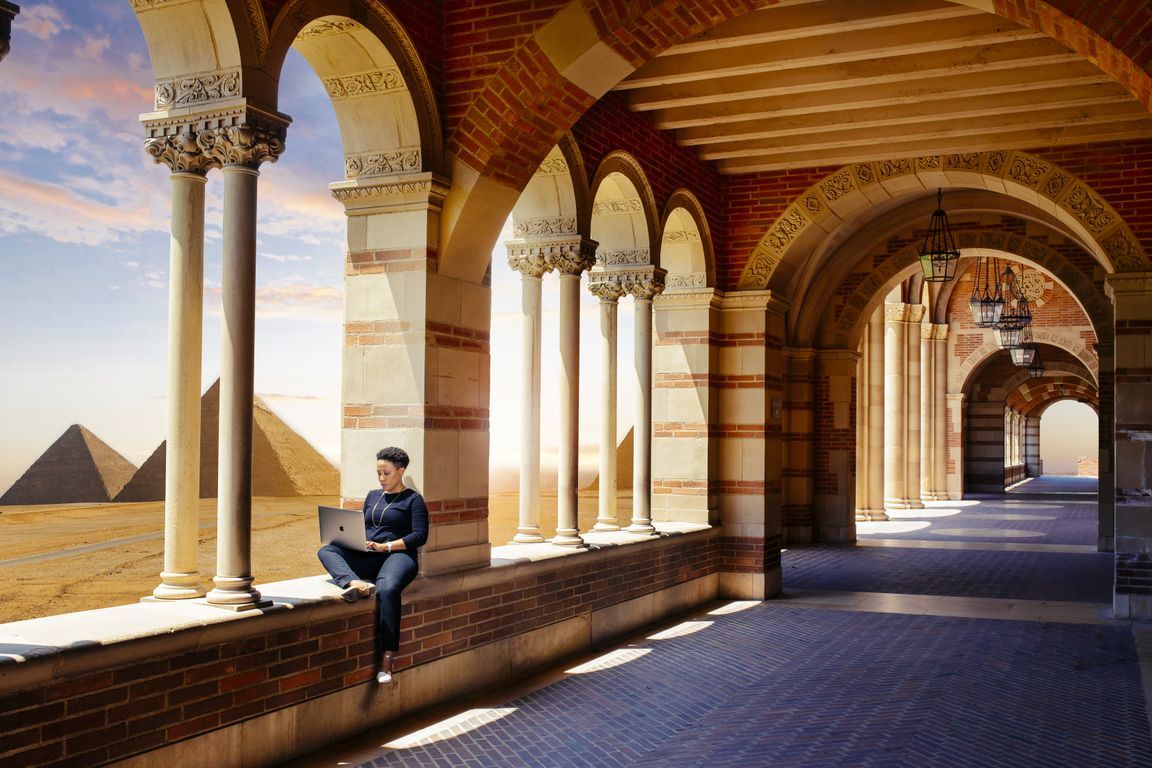Editor’s note: This story was updated April 22 to note the current names of the centennial initiatives.
Archived sheet music from the 1790s. Recorded interviews documenting the history of Los Angeles. Photos of Latin American and Caribbean journals. A wealth of digital resources is only one click away. OpenUCLA aims to accelerate what the UCLA Library is already doing: making scholarship even more accessible, affordable and open to the global community.
Check this out: As one of the top 10 academic research libraries in North America, the UCLA Library has a system that holds 12 million print and electronic volumes in 400-plus languages, logs 3.5 million in-person visits per year and welcomes more than 15 million online visitors. Indeed, the UCLA Library — an outspoken, proactive national advocate for open access — has long been a leader in making its knowledge publicly accessible. Now, the OpenUCLA initiative will work to expand these efforts, enabling even more inquiring minds — from the most expert of scholars to the youngest of learners — to walk through the doors of the library from anywhere in the world, from Paris to Tokyo.
OpenUCLA is one of four initiatives that were developed as part of the university’s Centennial Celebration. The Map and the Territory: 100 Years of Collecting at UCLA will raise awareness about the nearly 14 million objects cared for by the university; UCLA: Our Stories, Our Impact seeks to illuminate the role of UCLA in fighting for equity and social change in the country; UCLA Data for Democracy in L.A. will partner the university with K–12 teachers across the city to enrich learning and strengthen civic discourse; and OpenUCLA, led by the UCLA Library, will work to erase barriers to the university’s scholarship and share knowledge with people everywhere.
A History of Commitment
“The UCLA Library has long been deeply committed to the global movement toward open access — making knowledge available to people who need it, not just those who can afford it,” says Norman and Armena Powell University Librarian Virginia Steel, who is at the helm of the UCLA Library system. Among its many goals, the library advocates for state and federal legislation to make the published results of funded research publicly available, works to leverage its collections as course materials, and collects and digitizes its resources.
“This centennial initiative is an opportunity to take ever bigger steps in opening up the knowledge created at UCLA to the world,” Steel says. “As one of the top public universities in the world, we should make the results of our work freely accessible so society can benefit.”

24/7 Access to Rare Treasures
“Many people think libraries are just about books and paper, but we have all types of objects in our special collections — things that people might not associate with a library,” Steel notes.
Case in point: UCLA houses the only known recorded interview of author Harper Lee discussing To Kill a Mockingbird. The university also possesses other rare items, including Ethiopic manuscripts from the 16th century; an Aldous Huxley collection that includes audio, images and videos of the Brave New World writer; and South African embroideries portraying the effects of AIDS on the community. These items are only a small glimpse into the rich, diverse collections available online. In fact, UCLA currently holds the largest digital library in the University of California system.
Plans for OpenUCLA’s Digital Library Project include the digitization of more than 5,000 library resources and a dramatic expansion of the library’s open repositories. Among its many efforts, the library has plans to digitize a large collection related to the internment of Japanese Americans during World War II — materials valuable to everyone from the graduate research scholar to the young girl seeking to understand what her grandparents experienced. Buddhist temples in L.A., a topic many people aren’t aware of, are also being explored, as the library team works with faculty members to gather images to share online.
“We have amazing collections about notable politicians, people in the entertainment industry, historical events and more,” Steel says. “And we are constantly acquiring and digitizing even more items, so people can freely find and use them wherever they are.”
The Library centennial exhibit will open in early 2020, featuring select items from special collections that highlight the history of L.A., remarkable UCLA people and events, and news topics. While on view in the Charles E. Young Research Library, some items in the exhibit will be made available online — for anyone in the world to visit.
Connecting Communities, Increasing Links
“Part of OpenUCLA is also to make sure we build as many routes as we can for people to find us,” says Alison Scott, associate university librarian for Collection Management and Scholarly Communication. One creative way to direct more people to the university’s treasures is by hosting community gatherings called Wikipedia edit-a-thons.
According to Scott, when students start their research, a Google search will often result in a Wikipedia article that offers external links to additional resources. For example, say students want to study the advertising industry and how it marketed patent medicine, such as remedies or medical elixirs, in the 18th and 19th centuries. Currently, links in a Wikipedia article on patent medicine will go to UCLA’s digital collection of nearly 250 colorfully illustrated advertisement cards. Similarly, a search for yellowback novels published in Britain in the second half of the 19th century will yield a Wikipedia link to UCLA’s digital collection of yellowback covers. However, there are other fascinating digital collections that don’t currently have any links on Wikipedia.
“We’re planning to host more edit-a-thons to increase the [number, scope and quality of] Wikipedia entries that point to these wonderful collections,” Scott says. Held at least once a quarter, these fun all-day, drop-in events bring together content experts and librarians, who learn how to become Wikipedia editors and contributors, and focus on improving, expanding and adding entries on a specific theme. Using laptops provided by the library as well as their own, individuals help craft Wikipedia entries, adding citations and links to existing entries — and increasing the likelihood that users will discover UCLA’s collections through a search.
Recently, the UCLA Library, in partnership with the National Network of Libraries of Medicine, hosted a Wikipedia edit-a-thon that centered on improving women’s health information. Students, librarians, faculty and others in the global community gathered — in person and virtually — to add citations to Wikipedia’s articles on women’s health and wellness.
“This is a great opportunity for people to get together to share their knowledge and opinions,” Scott says. “As a result, Wikipedia as a shared knowledge base becomes more robust and better documented. And as a community, we each gain personal value from participating in a shared enterprise of lifelong scholarship.”

Serving Our Scholars
On campus, OpenUCLA aims to alleviate a major concern for students and their families: the high cost of course materials, estimated at $1,464 per student for the academic year. “Not only has the cost of going to school increased, but the cost for students to obtain the materials they need has gone up dramatically,” Steel says. “There are students who are hungry, may not be able to afford to live in Los Angeles or have difficulty paying for their course materials.” With the participation of faculty, the Affordable Course Materials Initiative identifies digital materials that can substitute for expensive textbooks and other course-required resources. The results have been inspiring.
For example, for “Sociology 145: The Sociology of Crime,” the library licensed a required text on mass incarceration as an e-book, giving 150 students 24/7 access. It cost the library less than 10 cents per use, and there was zero cost for the students. If not for the e-book, students would have paid $28 for an individual copy. In “Classics 10: Discovering the Greeks,” the library licensed a required text of Thucydides’ histories as an e-book, giving 209 students 24/7 access. It cost the library less than 4 cents per use, and students paid nothing. Individual copies would have cost $30. During the 2018–19 academic year, the program managed affordable online content for 120 courses, with a student enrollment of more than 7,000 — resulting in a savings of $800,000 for print content.
“We hope to raise the profile and awareness of this two-pronged effort,” says Steel, noting that these materials are only a subset of what may be required reading for students. “It can be impossible for the library to license some textbooks issued by commercial publishers, which is why it’s important we engage with faculty to create materials that are open and available for use, not trapped behind licensing restrictions or paywalls.”
Opening the Doors Wider
These are only a few of the two dozen–plus components of OpenUCLA, which is partnering with the Los Angeles Public Library and Los Angeles County Library on various events.
“OpenUCLA is what UCLA has always been about,” Scott says. “This initiative is intended to take our efforts to open library content, scholarly content and engagement with that content beyond our walls. We’re not just here for the few and the special; we’re here for our communities.”
Adds Steel, “OpenUCLA is not just about the local community, but also the global community and the need they have to access information — regardless of where they’re located.”
That’s a goal that speaks volumes.





